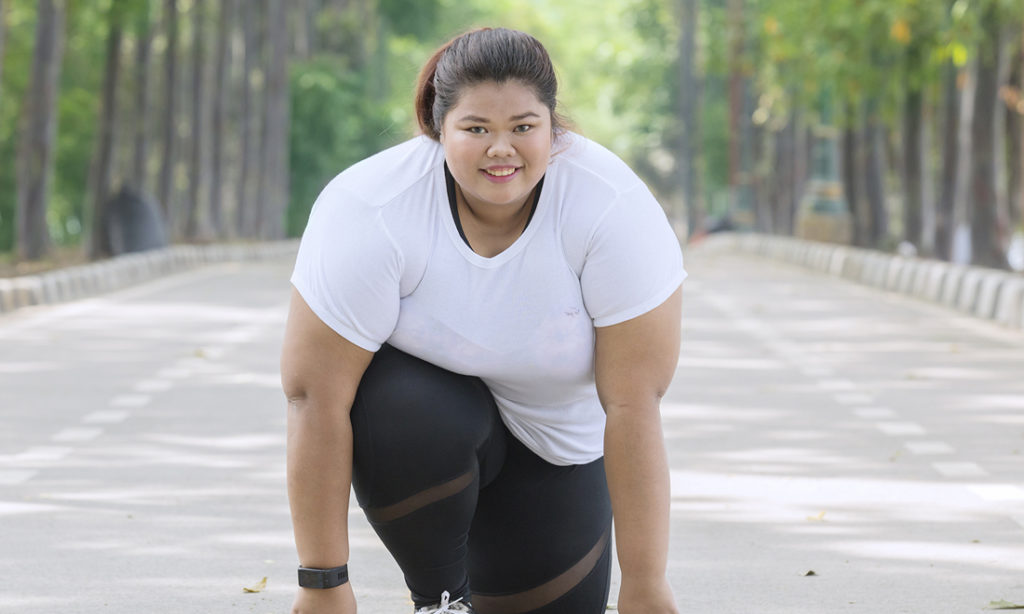Despite a plethora of gyms and diet solutions offered in our communities, obesity is still on the rise. In August 2020, Obesity Canada released its newest clinical practice guidelines. As a fitness professional, this article highlighted just how much the fitness industry is failing Canadians with excess weight. Rather than helping people with obesity, many fitness solutions may be outright hindering them.
Obesity science has come a long way in the past decade, and it is time for the fitness industry to catch up. Obesity is a complex chronic disease, not a simple weight loss equation of calories in versus calories out. While diet and exercise remain an important part of obesity treatment, it’s not a panacea for weight loss.
Research tells us that diet and exercise lead only to a modest weight loss of about three to five per cent of body weight. While this amount of weight loss does provide meaningful health benefits, it is typically less weight than many people are looking to lose. As a fitness professional, I believe that exercise is essential for everybody.
Dr. Sean Wharton, the lead author of the new clinical practice guidelines on obesity, calls physical activity “the best medicine for most medical problems.” But the research is pretty clear when it comes to weight loss; exercise has a modest effect. We need to stop selling diet and exercise as the key to a healthy weight. The truth is that many people with obesity require medical interventions such as medication or surgery to help manage their weight, not because they aren’t working hard to eat less and exercise but because there are many drivers to weight gain.
According to Obesity Canada, environment, genetics and fetal exposure in the womb, which are out of the control of the individual, have a greater influence on weight than diet and exercise. The power of fitness for someone with obesity is to improve health and well-being, not merely to burn calories. We need to move away from weight centered fitness paradigms so more people feel comfortable, accepted and successful in fitness settings, and can harness the many health benefits of exercise. If we continue to make weight loss the focus of people’s fitness endeavours, we risk disappointing and discouraging them from continuing to engage in physical activity.
Likely stemming from the misinformation that obesity has a simple lifestyle solution, fitness is fueling stigmatizing images and messages about our bodies, weight, and health. Social media is full of muscle-bound fitness folk sharing their inspirational messages about exercise being the key to a great body if people are just willing to work hard enough. A quick google search of motivational workout quotes will bring up words like lazy, unmotivated, and excuses. Fitness programs are full of before and after photographs making weight loss the marker of success. This type of messaging is not moving people into action but instead, it is stigmatizing people with obesity as couch dwellers with little willpower, work ethic, and motivation to change. Worse, when clients do not see results, fitness professionals blame them for not following their advice or not being truthful about their lifestyle choices. We can and must do better. We cannot assume to know about someone’s eating and exercise habits based on their body size. We must check our biases and fight the stigmatization of obesity. Throughout my fitness career people have shared with me their personal struggles to lose weight. These people are not sitting on the couch eating bad foods. They are warriors who have been fighting all along. They are the victims of weight bias and bad information. They have been told that lower bodyweight leads to health and that weight loss is easily achieved by people willing to take personal responsibility. When we correct these misconceptions and take the blame and shame out of fitness, we see people with obesity thrive.
In 2018, I accompanied several clients, of varying ages and sizes, to Hawaii to complete the Honolulu Marathon. I had the great privilege of crossing the finish line with a gentleman who, despite following a healthy diet and exercise program, was still over 300 pounds. Yet, he did what most people with a “normal” BMI cannot do, a marathon. He was fit, much fitter than most, and crossed that finish line long before many people half his size. Like any athlete, he had to be motivated and disciplined to train for such a long-distance event. Unfortunately, most people wouldn’t assume when meeting him that he was an athlete. Their bias would stereotype him. The reality is that body size is not an indication of fitness.
The good news is that we are seeing glimmers of change, from TV commercials to store mannequins, we are starting to embrace a diversity of sizes. There are even a few fitness social media posts out there that encourage people to abandon the scale and embrace a new kind of fitness. A fitness for everybody.
It’s time to put fitness in its rightful place as a health-promoting tool rather than a weight-loss tool. Let’s use fitness as a platform to build self-esteem and confidence rather than tear it down. Let’s create a movement where everyone is welcome regardless of size because we know that everyone benefits from physical activity regardless of whether or not they lose weight. We need to help people define fitness goals that are about so much more than weight loss because the goal is to live well, not to live skinny. As a fitness professional, my goal is to help people get strong and healthy, so they live their lives to the fullest. Their weight has very little to do with this.



